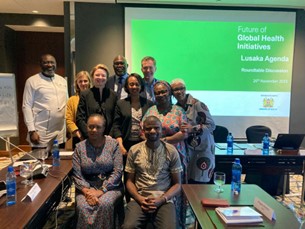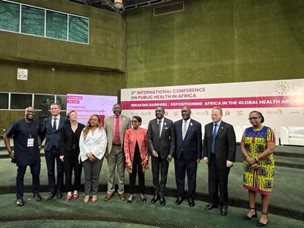Participants at two Future of Global Health Initiatives (FGHI) meetings in the margins of the 3rd Conference on Public Health in Africa expressed strong support for the FGHI process and its content and provided useful feedback on the draft Lusaka Agenda: Conclusions of the Future of Global Health Initiatives Process, that the Co-Chairs will take on board as they finalize the Lusaka Agenda.
The Lusaka convenings mark the end of a series of consultations held over the past 14 months. The FGHI process will conclude with the publication of the Lusaka Agenda on UHC Day on 12 December. It will then be shared with the leadership of GHI boards, who will consider how to take forward the actions outlined.
26 November Future of Global Health Initiatives Roundtable
Meeting co-chairs Dr John-Arne Røttingen, FGHI Co-Chair, and Desta Lakew, FGHI Steering Group member, were delighted to have Dr Lia Tadesse, Minister of Health of Ethiopia, join the FGHI consultation, which highlighted the leadership of African public health policy makers and advocates in driving alignment and coherence of external funding and technical assistance to national priorities.
Participants from ministries of heath, civil society organizations and global and regional health organizations and initiatives provided feedback on the draft Lusaka Agenda, which sets out a roadmap to foster better alignment and coherence of external funding and technical assistance – including from global health initiatives (GHIs) – to government priorities, in support of country-led priority-setting processes and trajectories to strengthen health systems toward universal health coverage (UHC).
Discussions in the second part of the meeting focused on steps that meeting participants are taking/can take to drive this change agenda forward and opportunities to link the FGHI process outcomes to African political and policy processes to drive visibility and implementation. Participants were updated on work being done to define an accountability mechanism within the African Union to monitor implementation of the Lusaka Agenda outcomes, as a complement to the oversight that GHI boards will provide.
In her opening reflections, Minister Tadesse noted that while the past few years have shown how countries’ investments in health and health systems have allowed them to respond to health challenges, as evidenced by the Covid-19 pandemic, they have not been enough. Countries are facing a multitude of challenges – from outbreaks, climate change, economic constraints, to changing epidemiology. These all require countries and their partners not just to do more, but to work differently.
While one participant spoke compellingly about their country’s commitment to look at its own systems, to build capacity – including through improved accountability systems, others noted the need to address challenges around power imbalances, inefficiencies, transparency and accountability, and called for change according to what ministries of health need, not just what donors want.
The meeting report can be found here.
Official CPHIA Side Event – The Future of Global Health Initiatives: The Future We Want to See
On 27 November, Africa CDC and Amref Health Africa, together with FGHI Co-Chairs Mercy Mwangangi and John-Arne Røttingen, convened two panel discussions with public health leaders committed to catalyzing collective action to shape a global health financing ecosystem that is fit for purpose through to 2030 and beyond. Panellists discussed their vision of aligning external financing to one country plan, budget and M&E framework, how regional and global mechanisms and institutions are improving the way they work together to increase the efficiency of external support to countries and its alignment to country priorities, and how African representation on the boards of global health initiatives can be strengthened to give the continent more of a voice in decision-making.
Here is some of what the speakers and panellists had to say:
Dr Jean Kaseya, Director-General of Africa CDC, welcomed the emerging FGHI process outcomes and noted that Africa CDC is fully committed to supporting the agenda. He highlighted the need for better alignment among partners and strong leadership to achieve real change.
Dr Githinji Gitahi, Group CEO of Amref Health Africa, emphasized the progress that global health initiatives have helped to drive in infectious disease programs and called for ministers, the African Union, Africa CDC and others to take the FGHI outcomes forward to achieve similar progress in the wider health system.
Hon Kwaku Agyemang-Manu, Minister of Health, Ghana, spoke about the importance of domestic resource mobilization and aligning GHI funding with national budgets to ensure governments have the information they need to make impactful decisions.
Hon Austin Demby, Minister of Health and Sanitation, Sierra Leone, emphasized the importance of patient-centred care and UHC that follows the life stages to ensure that health is a priority at different stages. He noted that this doesn’t counter the vertical system but means that GHI partners must listen to countries and support their efforts.
Rosemary Mburu, Executive Director WACI Health, highlighted the benefits of the draft FGHI process outcomes, which include leveraging the efficiency gains from alignment. She highlighted that while governments should lead the development of country plans, all in-country stakeholders, including civil society and communities, must contribute to their development.
Dr Magda Robalo, Founder and President, Institute for Global Health and Development, emphasized the importance of strengthening the voices of African countries on GHI boards to improve decision-making and achieve equitable outcomes. She highlighted that as we look to the long term, FGHI outcomes must be complemented by wider investments in infrastructure.
Dr Ahmed Ogwell Ouma, Deputy Director-General of Africa CDC, noted that while the primary focus of the FGHI process is on GHIs, there is a need to look at the broader health financing ecosystem, so that it is treated as one package and utilized more efficiently. He also pointed to the importance of identifying pathfinder countries where small health system changes can have a major impact.
Ms Jo Scott-Nicholls, Senior Health Advisor, UK’s Foreign, Commonwealth and Development Office, emphasized a donor perspective, highlighting the achievements of the current health and development architecture, and calling for an evolution to drive impact for the coming years and decades. She noted that donors must look at their behaviours to see how they can be adjusted to drive change.
Mr David Marlow, Interim CEO of Gavi, highlighted that Gavi is committed to the FGHI agenda and has been actively participating throughout the process. He noted that Gavi is aligned with the long-term shifts the short-term priorities but not with all the short-term actions, which Gavi hopes to explore in 2024.
Dr Matshidiso Moeti, Regional Director of WHO-AFRO, said that she felt encouraged by the FGHI process and the explicit acknowledgement of the need to invest in health systems. She emphasised that the agenda needs to be continued into 2024 with openness and transparency.

Initiatives Lusaka Consultation

The Future We Want to See official CPHIA side event,
co-convened by Africa CDC and Amref Health Africa.
